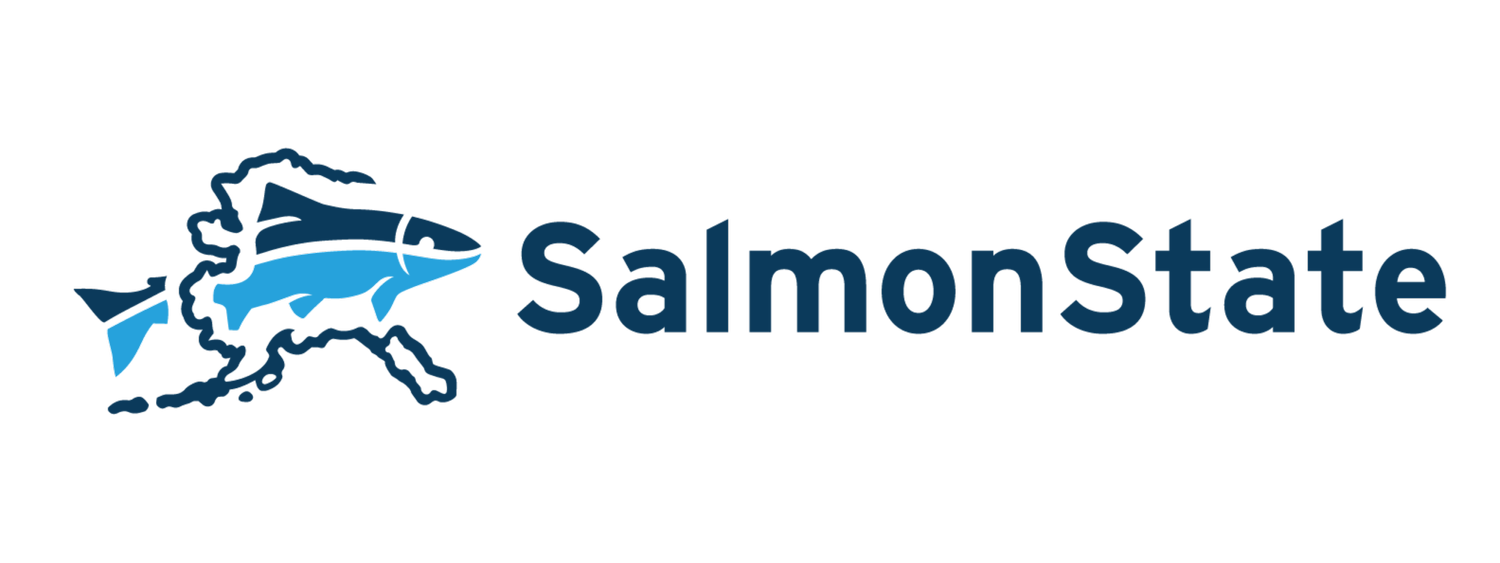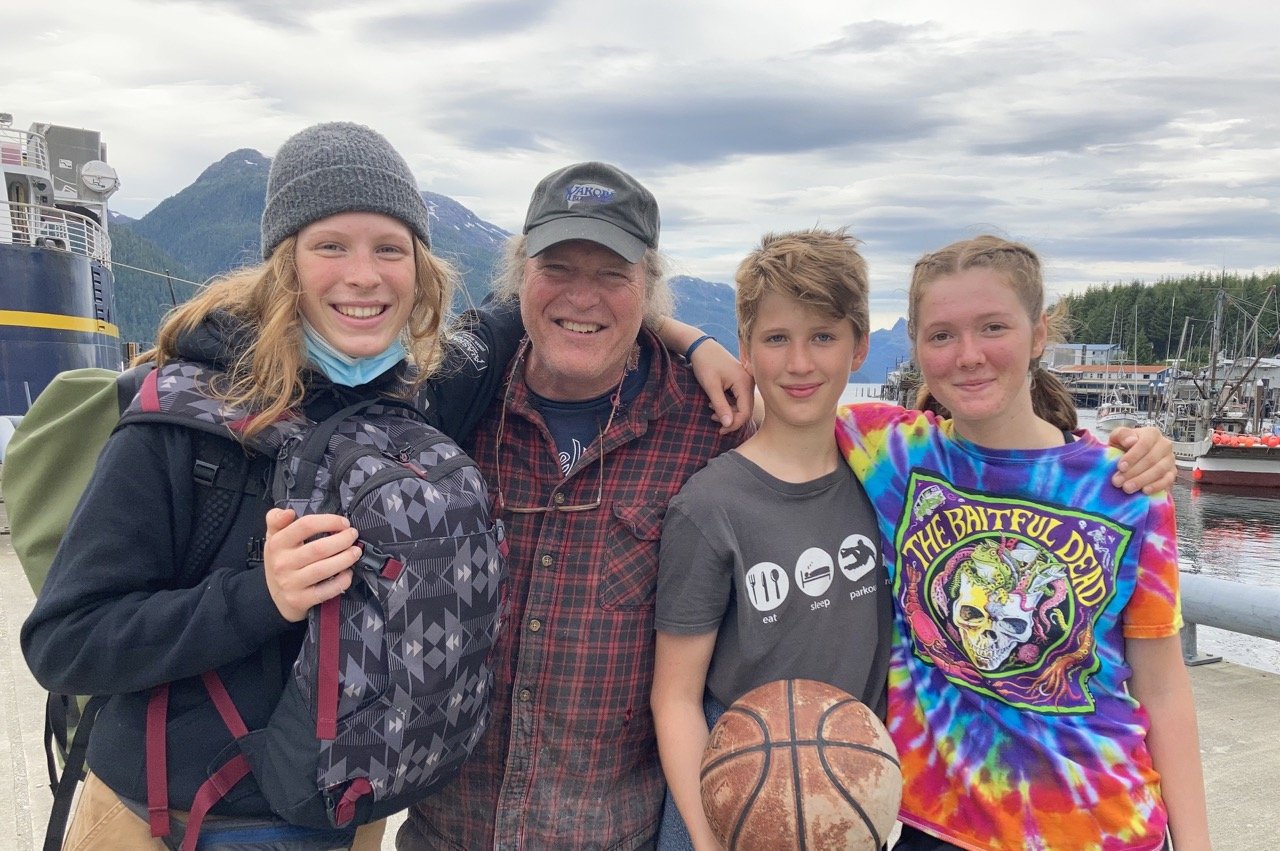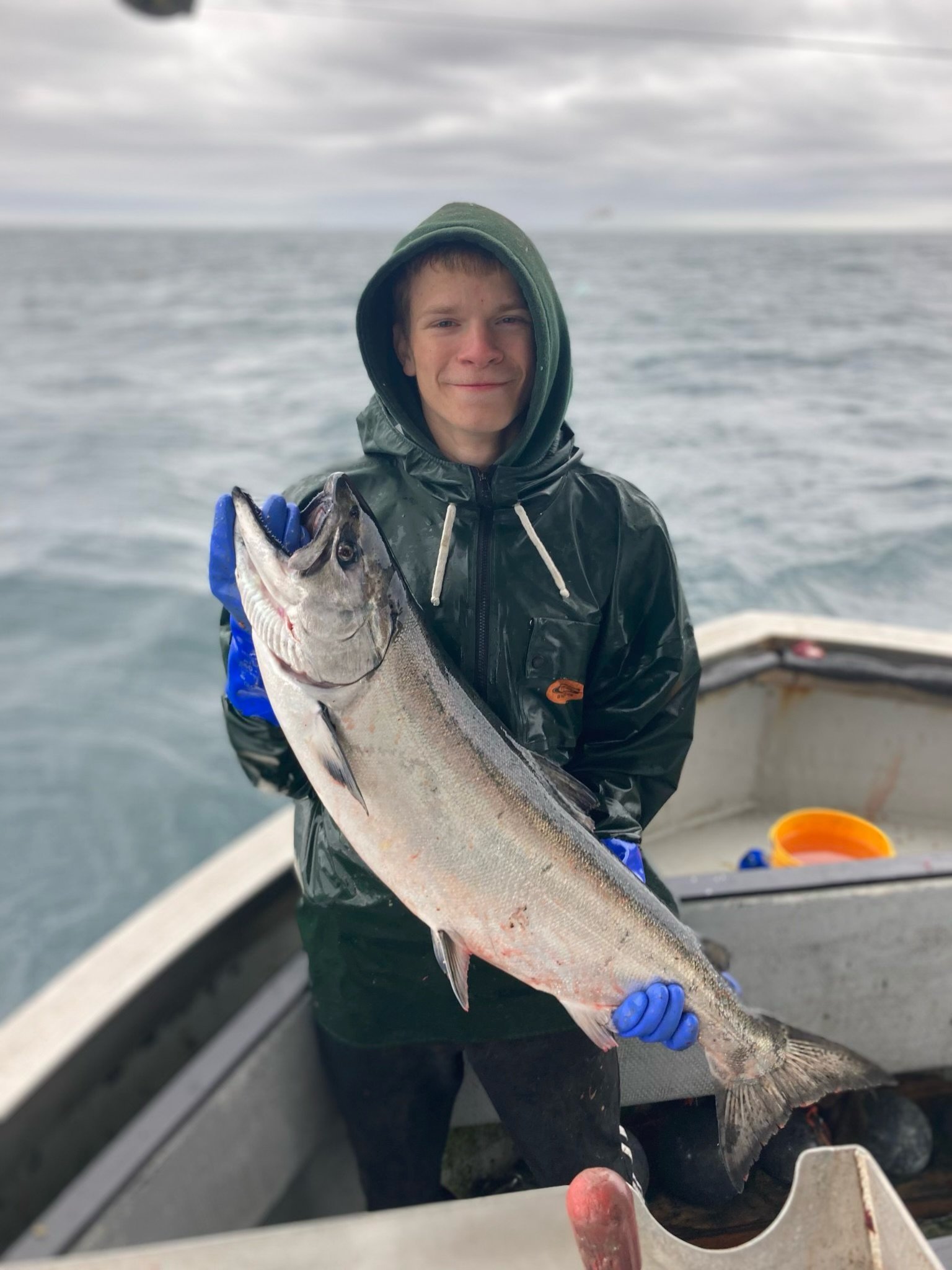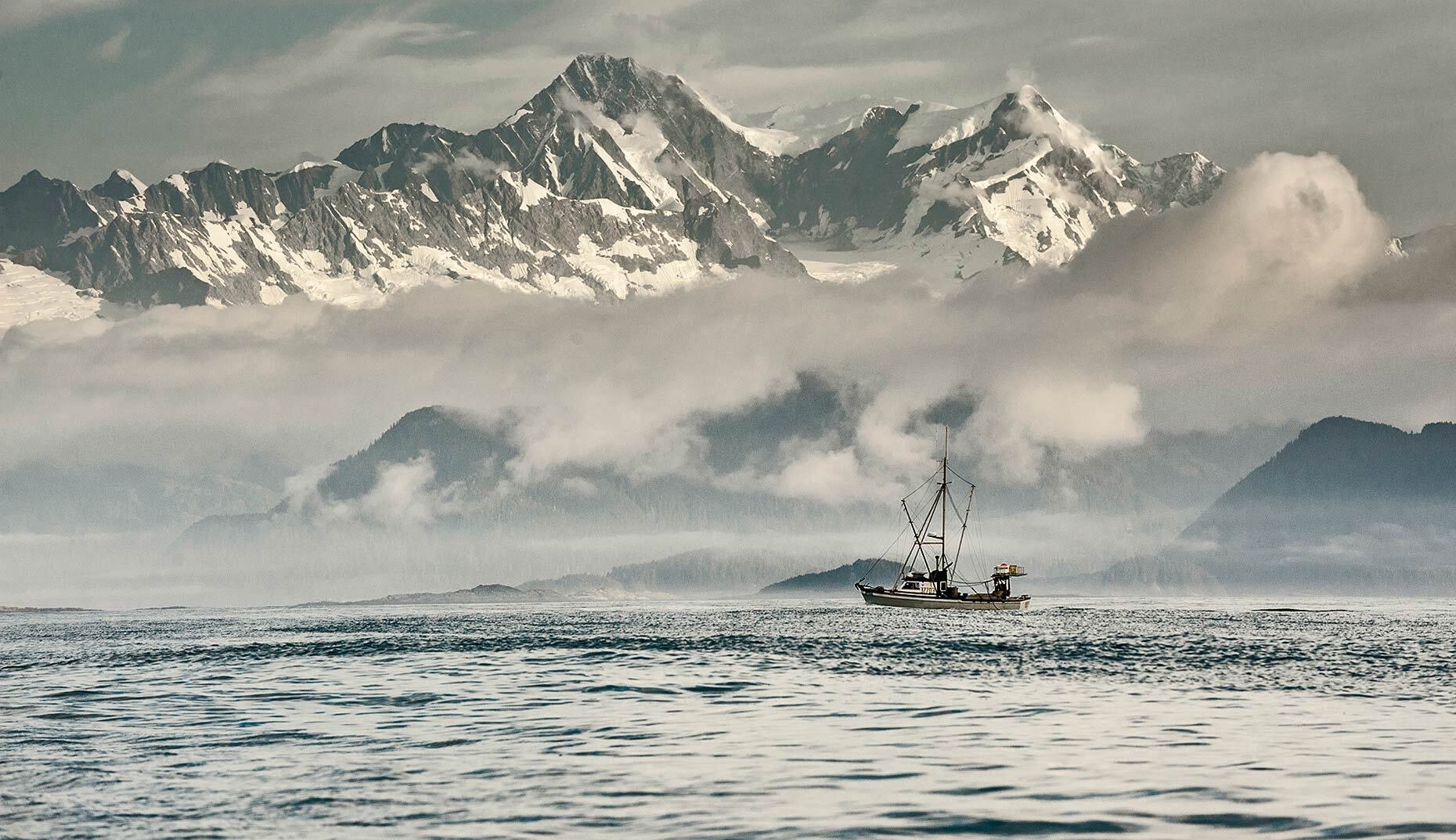Joe Emerson
Southeast Alaska trollers are threatened by a misguided lawsuit from the Washington-based Wild Fish Conservancy, which alleges that this small-boat, family-owned fishery is negatively impacting Southern Resident Killer Whales.
The lawsuit ignores and distracts from the real causes of killer whale decline in the Salish Sea, which are far closer to home: urban and industrial development, contamination, and dams.
Trolling is a small-boat, sustainable, family-owned hook and line fishery that has an 85% residency rate in Southeast Alaska and a big presence in small communities.
These stories are from spring of 2023. In August 2024, the 9th U.S. Circuit Court of Appeals overturned a District Court decision that could have temporarily halted troll fishery, ruling that the lower court had “abused its discretion.”
Joe Emerson is a co-owner of Shoreline Wild Salmon, a SalmonState Marketplace partner.
Images: Joe Emerson with his grandkids.
Prospector with shovel, gold pan, pick axe, and rifle; leans on shovel at edge of stream; buildings in background. Klondike. Alaska State Historical collections. (Not Joe Emerson’s great grandfather, just for illustrative purposes.) ASL-P277-001-182
Joe Emerson’s parents, Bob and Marcelle Emerson, trolling in 1973.
Joe Emerson's daughter Molly, and sons Erik and Tyler fishing on his boat as kids
“My great grandfather came here from Missouri in 1898 during the Klondike Gold Rush. He and two or three other guys built a boat in Missouri and put it on a train, dumped it in the water in Seattle and rowed and sailed up here from Seattle. They stopped in Juneau. I think they were about half crazy, and they were broke.
He was a doctor, and he started a medical practice here. The other guys he came with went to work at the AJ mine here in Juneau.
Four generations of my family have now been participating in the salmon troll fishery. And I'm proud to be identified as a commercial salmon troller, lifelong Alaskan, and an environmentalist.”
—Joe Emerson, fourth generation salmon troller, F/V Tommy L II, co-owner Shoreline Wild Salmon
Joe Emerson trolling in 1973
Joe Emerson’s mother, Marcelle Emerson
Joe Emerson’s father, Bob Emerson
Joe Emerson’s father, Bob Emerson
Joe Emerson’s son, Tyler, swinging on the boat
Joe Emerson’s children Molly, Tyler and Erik
Joe Emerson’s daughter Molly on his boat
Joe Emerson’s son, Tyler, helping in the fish hold
“My father was a Coast Guard helicopter pilot. He retired from the Coast Guard, and I started fishing with him and my mother out on the open ocean on the Fairweather grounds, sometimes 50, 60 miles offshore, when I was in high school. It was a unique experience to share with my parents.
After college, I bought my own vessel. I've been doing this on my own since 1979, and I raised my family fishing.
We have a swing that we still have mounted on the boom over the back deck and there was always a kid swinging back and forth all day long. They would tow little boats and stuff off of the back of the stern of the boat and help us clean fish. All my kids have fished with me. Now some are fishermen, also.
There's just so many memories. I like seeing all the whales interacting with different marine mammals, and fish, and birds. There's just always something new that's gonna happen every day that you probably haven't experienced before.
I still have kids fish with me during the summertime. Mostly high school kids. I like sharing the experience of being outdoors and exposing them to some of the things that you see in more remote areas of Southeast Alaska. It makes it fresh for me to see young people excited about what they're seeing.
Most trolling boats are operated by families. I'm 66 years old, still loving it.”
—Joe Emerson, fourth generation salmon troller, F/V Tommy L II, co-owner Shoreline Wild Salmon
Joe Emerson and Shoreline Wild Salmon co-owner Marie Rose
“To catch salmon is such a privilege. I consider myself extremely lucky. I feel a certain amount of responsibility that goes along with that privilege. And I really strongly believe in habitat protection for wild salmon, and also responsible fisheries management. These fish are, they're just like gold, and they should be treated with extreme care.
That's how I got into this business of selling and marketing my own fish with my partners… and so we decided to try marketing some of our own salmon to Lower 48 farmers markets. We not only had the fish, but we had a story that interested people. And in the process of doing farmers markets, we were always answering questions and showing people videos about life in Southeast Alaska, how we catch the fish, how this is a sustainable fishery.
Trolling is not a volume fishery. The emphasis is on quality more than it is volume. And also we have a unique fishery in that our fishing gear allows us to release fish that are not the target species unharmed.
It truly is one of the most sustainable fisheries on the west coast of the United States.”
—Joe Emerson, fourth generation salmon troller, F/V Tommy L II, co-owner Shoreline Wild Salmon
The mouth of the transboundary Unuk River in Southeast Alaska. 90% of the Canadian side of the Unuk is staked with or has operating gold mines. Photo by Chris Miller | csmphotos.com
“I joined the Wild Fish Conservancy when I first found out about them. I thought that they were going to advocate for the restoration of salmon habitat. I'm all for saving wild salmon.
But when I found out about their lawsuit through the media, I just really felt like it was actually going to be more destructive than productive. I don't think that the action they're taking is going to save salmon or save the orcas. I think it might produce the opposite effect partly because the salmon troll industry in Southeast Alaska is completely dependent on the health of king salmon to exist. There are very few commercial fishermen that want to catch them all because we don’t want a future without salmon.
The majority of trollers are very conscientious about managing the fishery responsibly and sustainably. It's key to our longevity as fishermen. And I don't think you'll find greater advocates than the people in the fishing industry that are totally dependent on these stocks.”
—Joe Emerson, fourth generation salmon troller, F/V Tommy L II, co-owner Shoreline Wild Salmon
Joe Emerson’s grandson, Dane Pedersen, with a troll-caught salmon
Development around Seattle
Contamination from the abandoned Canadian gold mine the Tulsequah Chief, in the Taku River watershed Photo by Chris Miller
Orcas in Southeast Alaska
“The Wild Fish Conservancy should be an ally of the troll fleet. They never approached us about doing things together to enhance salmon or to protect salmon habitat. And there's so many things that we have in common that we really should be working together to… actually help preserve the salmon habitat and rebuild these runs.
I hate to see all these funds expended on legal fees when they could be expended on salmon and enhancement or restoration of habitat. It just seems like a tremendous waste of money. These southern resident orca, in order to protect those whales, most of the protection has to occur in their home ground. There's a tremendous amount of marine traffic that's impacting them. The degradation of the habitat and the local salmon is a problem that I think only can be addressed within Washington State. I think that the troll fishery up here and the trollers are more than willing to assist in coming up with solutions. And I think that everybody needs to sit down and talk more together and communicate outside of the courtroom. There's a lot of things that we could do that would be really productive. And this lawsuit is distracting us from that.
During the last 30 years, the troll fishery has been reduced considerably from what it was. And it really hasn't had any impact in turning some of these stocks around. And it's mostly because the troll fishery does not catch that many.
There isn't a troller out here that doesn't want to see these fish survive. And a lot of the trollers have willingly accepted many of the conservation efforts that have taken place over the last 30, 40 years. And I know they're willing to do that in the future, if it really produces some kind of real result.”
If people want to really have an impact, we have to do some things to rectify some of the damage that's been done to salmon habitat in the Pacific Northwest.”
—Joe Emerson, fourth generation salmon troller, F/V Tommy L II, co-owner Shoreline Wild Salmon
“I really do believe that the way we're fishing is actually the way all fish should be caught. I think every fish should be taken care of meticulously, one at a time. And the attention needs to be given to each fish. I'm not a big advocate for industrial fishing (like pollock trawling), where it's kind of factory fishing. I think we'd be better off and more people to be employed if we used smaller boats and more people were involved. More people in the community end up being employed and the income is more evenly distributed throughout the community. Trolling is a great way of making a living, and I think it's a great way of harvesting fish.
I'm really proud of the quality that patrollers produce. I'm proud of the fact that most of the trollers come from the environmental community and are concerned about the well being and future of salmon. I know I am.
And in the past, the troll fishery has been very involved in ending things like high seas gill netting and trawl bycatch. And many other issues, like salmon habitat. So I think that the troll fishery is a great asset to Southeastern Alaska, if not the entire Pacific Northwest.”
—Joe Emerson, fourth generation salmon troller, F/V Tommy L II, co-owner Shoreline Wild Salmon
Joe Emerson’s grandson, Dane Pedersen, trolling with him
“One of the things I tell people when we are marketing fish — I think it's important.
There are so few things in the everyday American’s cuisine that are wild. We don't eat very many wild foods anymore. Yet, even 100 years ago, and the previous millions of years, people were eating almost entirely wild foods. Wild salmon is one of the very few wild things you can buy in a grocery store.
You can tell when you're eating the salmon that your body recognizes this as a healthy food that you should be eating. And so I just can't emphasize enough how important it is that we maintain these wild populations and that people have some access to this wild food.
The Wild Fish Conservancy lawsuit — if they were successful in closing the troll fishery, even if it was only for one year, it would have a detrimental impact on the small scale processors. Like the business that I have, Shoreline Wild Salmon. For small processors and fish buyers, it's taken a while to develop the clientele that they service. The different grocery stores, the different restaurants. Some of the processors, I don't know if they could recover. It might drive them out of business. If we were to have to tell our customers that we couldn't produce any salmon or provide them with salmon for a year, they would probably go elsewhere. And that elsewhere probably would be farmed salmon.”
—Joe Emerson, fourth generation salmon troller, F/V Tommy L II, co-owner Shoreline Wild Salmon
Joe Emerson with a troll-caught salmon
“If this lawsuit was to end the troll fishery, it would also end a large number of the people that are salmon advocates in Southeastern Alaska. And that's one of the things that concerns me, because there's a lot of other issues, like the interception of salmon by the trawl fishery. There are these mining projects on our transboundary rivers. I really worry that if the troll fishery was to end there wouldn't be as strong of a voice in Southeastern Alaska for habitat restoration and, and responsible management of Chinook salmon. I really believe that the Wild Fish Conservancy should really be working with the troll fishery rather than working against the troll fishery.
The things that concern me most politically is really the protection of these salmon rivers — transboundary rivers in Southeastern Alaska, and the protection of salmon habitat throughout the Pacific Northwest, British Columbia, Washington, Oregon, Idaho. I'm a big advocate for dam removal and restoring as much of the river ecosystem to its natural state. My whole life, my whole livelihood is dependent on the health of these wild salmon. If I'm going to have a future in fishing, there's gotta be a future for wild salmon.
That's where my priorities lie. Wild salmon.”
—Joe Emerson, fourth generation salmon troller, F/V Tommy L II, co-owner Shoreline Wild Salmon






















